Input interpretation

chloroacetic acid
Chemical names and formulas
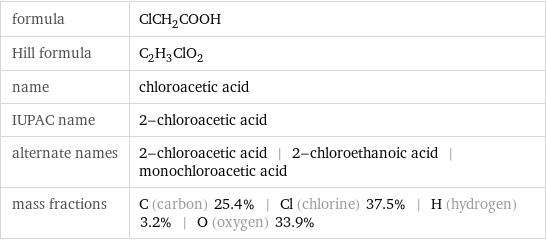
formula | ClCH_2COOH Hill formula | C_2H_3ClO_2 name | chloroacetic acid IUPAC name | 2-chloroacetic acid alternate names | 2-chloroacetic acid | 2-chloroethanoic acid | monochloroacetic acid mass fractions | C (carbon) 25.4% | Cl (chlorine) 37.5% | H (hydrogen) 3.2% | O (oxygen) 33.9%
Lewis structure
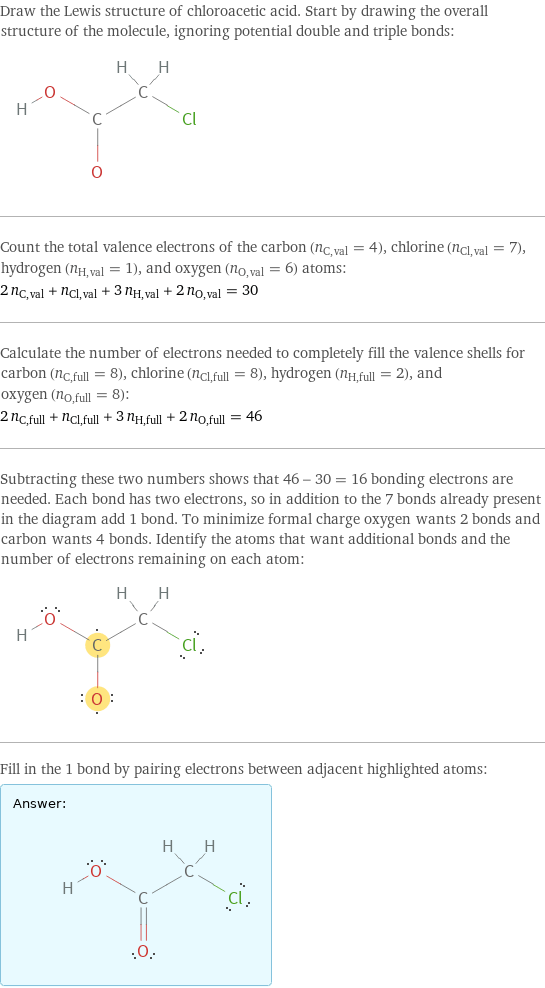
Draw the Lewis structure of chloroacetic acid. Start by drawing the overall structure of the molecule, ignoring potential double and triple bonds: Count the total valence electrons of the carbon (n_C, val = 4), chlorine (n_Cl, val = 7), hydrogen (n_H, val = 1), and oxygen (n_O, val = 6) atoms: 2 n_C, val + n_Cl, val + 3 n_H, val + 2 n_O, val = 30 Calculate the number of electrons needed to completely fill the valence shells for carbon (n_C, full = 8), chlorine (n_Cl, full = 8), hydrogen (n_H, full = 2), and oxygen (n_O, full = 8): 2 n_C, full + n_Cl, full + 3 n_H, full + 2 n_O, full = 46 Subtracting these two numbers shows that 46 - 30 = 16 bonding electrons are needed. Each bond has two electrons, so in addition to the 7 bonds already present in the diagram add 1 bond. To minimize formal charge oxygen wants 2 bonds and carbon wants 4 bonds. Identify the atoms that want additional bonds and the number of electrons remaining on each atom: Fill in the 1 bond by pairing electrons between adjacent highlighted atoms: Answer: | |
3D structure
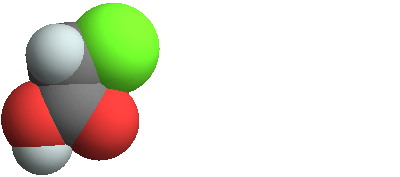
3D structure
Basic properties
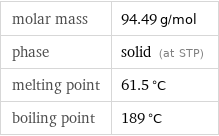
molar mass | 94.49 g/mol phase | solid (at STP) melting point | 61.5 °C boiling point | 189 °C
Units

Solid properties (at STP)

vapor pressure | 0.7499 mmHg
Units

Thermodynamic properties
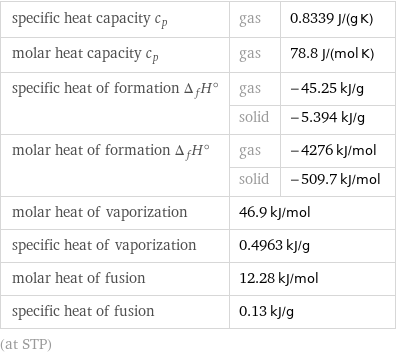
specific heat capacity c_p | gas | 0.8339 J/(g K) molar heat capacity c_p | gas | 78.8 J/(mol K) specific heat of formation Δ_fH° | gas | -45.25 kJ/g | solid | -5.394 kJ/g molar heat of formation Δ_fH° | gas | -4276 kJ/mol | solid | -509.7 kJ/mol molar heat of vaporization | 46.9 kJ/mol | specific heat of vaporization | 0.4963 kJ/g | molar heat of fusion | 12.28 kJ/mol | specific heat of fusion | 0.13 kJ/g | (at STP)
Chemical identifiers
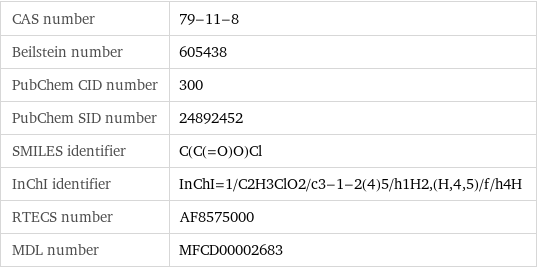
CAS number | 79-11-8 Beilstein number | 605438 PubChem CID number | 300 PubChem SID number | 24892452 SMILES identifier | C(C(=O)O)Cl InChI identifier | InChI=1/C2H3ClO2/c3-1-2(4)5/h1H2, (H, 4, 5)/f/h4H RTECS number | AF8575000 MDL number | MFCD00002683
Toxicity properties

lethal dosage | 580 mg/kg (oral dose for rats)

probable lethal dose for man | 600 mL (milliliters) long-term exposure limit | 1 mg/m^3 (over 8 hours)